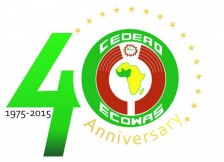Basic information
|
Welcome to the Economic Community of West African States (ECOWAS). Established on May 28 1975 via the treaty of Lagos, ECOWAS is a 15-member regional group with a mandate of promoting economic integration in all fields of activity of the constituting countries. Member countries making up ECOWAS are Benin, Burkina Faso, Cape Verde, Cote d’ Ivoire, The Gambia, Ghana, Guinea, Guinea Bissau, Liberia, Mali, Niger, Nigeria, Sierra Leone, Senegal and Togo Considered one of the pillars of the African Economic Community, ECOWAS was set up to foster the ideal of collective self-sufficiency for its member states. As a trading union, it is also meant to create a single, large trading bloc through economic cooperation. Integrated economic activities as envisaged in the area that has a combined GDP of $734.8 billion, revolve around but are not limited to industry, transport, telecommunications, energy, agriculture, natural resources, commerce, monetary and financial issues, social as well as cultural matters. Expectations of economic integration have always been high and a lot has been accomplished by the regional group since the endorsement of the treaty which gave it the required legal teeth. Going by current assessments, the regional body has exceeded the expectations of its founding fathers. Today, the organisation is being acknowledged globally as a successful regional body. ECOWAS can be seen now as a toast to a workable integration and regional co-existence. The Vision of ECOWAS is the creation of a borderless region where the population has access to its abundant resources and is able to exploit same through the creation of opportunities under a sustainable environment. What ECOWAS has created is an integrated region where the population enjoys free movement, have access to efficient education and health systems and engage in economic and commercial activities while living in dignity in an atmosphere of peace and security. ECOWAS is meant to be a region governed in accordance with the principles of democracy, rule of law and good governance. It was in order to realise this vision unimpeded that the ECOWAS administrative machinery based in Abuja, Nigeria, transformed its Secretariat to a Commission in January 2007. Instead of an Executive Secretary, what we now have is an empowered President of the Commission with a Vice President and Fifteen Commissioners. By their working, ECOWAS is now pre-occupied with the implementation of critical and strategic programmes that will deepen cohesion and progressively eliminate identified barriers to full integration as envisaged. Today, as the economies of African countries continue to witness steady growth, West Africa’s remains one of the strongest on the continent, growing by as much as 6.3 percent in 2013 and this largely due to the collective prosperity drive of ECOWAS. By increasing year-on growth, the region is now demonstrating that it has the potential to become financially independent and address challenges hampering its economic and social development. In this regard, the Commission is creating a favourable environment for rapid economic development through the regional integration process. The commission also believes that regional economic growth should begin with prudent macro-economic policies. For this reason, ECOWAS is investing in the social sector and formulating economic policies within the framework of a regional development programme. As it aims to improve economic integration, ECOWAS has continued to develop investment and promotion services and has already completed various investment climate study field missions in member states. As ECOWAS enters its 40th year of existence, considerable efforts have now been made in harmonising macroeconomic policies and private sector promotion towards achieving economic integration. These efforts have given rise to some initiatives which include implementation of the roadmap for the ECOWAS single currency programme, monitoring and evaluation of performance and macroeconomic convergence, management of the ECOWAS Macroeconomic Database & Multilateral Surveillance System (ECOMAC) as well as co-operation with other regional and international institutions. With a region energised by a common purpose, West African citizens can also take ownership for the new vision of moving from an ECOWAS of states to an ECOWAS of people by 2020. As currently set up, ECOWAS institutions draws strength from its main body-The Authority of Heads of States and Government. The others are Council of Ministers, the Commission, the Community Parliament, the Community Court of Justice, Specialised Technical Committees as well as the ECOWAS Bank for Investment and Development (EBID). There are other Specialised Institutions comprising the West African Health Organisation (WAHO), West African Monetary Agency (WAMA) as well as the Inter-governmental Action Group against Money Laundary and Terrorist Financing in West Africa (GIABA). Our regional group also has Specialised Agencies and there are currently three- ECOWAS Gender and Development Centre, Youth and Sports Development Centre as well as the Water Resources Coordination Centre. |




